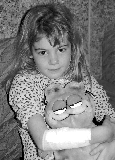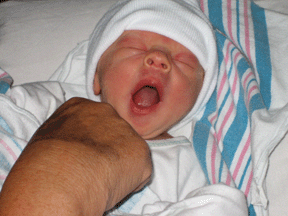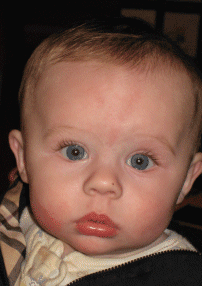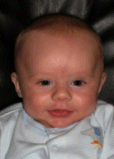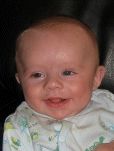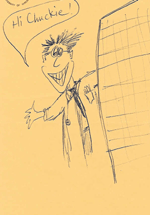| i-Newsletter |
|
|
|
|
|
Artist Unknown |
|
|
|
Brielle |
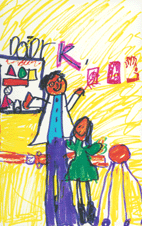 |
| Tina |
 |
| Rebecca |
|
| |
| Europe-wide food color ban called for. UK study that demonstrated increased impulsivity and decreased concentration in children following consumption of drinks containing additives is behind the call from the UK Foods Standard Agency for total ban on the use of artificial colors in foods. Ban would have to be agreed by EU members. |
| Dr. K's comments: It's about time! I can only hope that FDA will follow the suit, but judging on the past "performance" this may be only wishfull thinking. |
|
|
| Antibiotics do not work in sinus infections. Analysis of nine trials published in Lancet recently, shows that antibiotics do not make difference in the outcome of sinus infection, and should not be given even if the symptoms persist for longer than 7 days. This recommendation was recently published by British National Institute for Clinical and Health Excellence (NICF). |
|
| Probiotic for infantile colic. Swedish company BioGaia has started marketing BioGaia Probiotic Drops for infants that have shown effective in control of colics. Preparation contains Lactobacillus reuteri Protectis and reportedly has no known side effects even in young infants. |
|
| How and what are infants fed may affect their early brain development. London researchers found preterm babies fed enriched formula milk in their first weeks consistently outperformed other premature babies in IQ tests. Their latest study, published in Pediatric Research, shows the benefits continue into the teenage years. It also found a particular part of the brain is better developed in those given the enriched milk. The care that premature babies receive in their first few hours and days of life is crucial and will shape their future development and quality of life. The team from Great Ormond Street Hospital for Children and the UCL Institute of Child Health note that while nutrition has been linked with behaviour, their findings are among the first to show how early feeding may even alter brain structure. |
|
| Six-minute nap may boost your memory. German researches from the University of Duesseldorf reported in New Scientist magazine that even a short nap may significantly boost one's memory. Following a short can-nap students who took it performed on memory tests significantly better than students who did not. Dozens of previous studies have probed the relationship between sleep and memory, with clear evidence that body's natural sleep-wake cycle plays an important role. This study however appears to confirm that even the "ultra-short" nap may launch efficiently memory processing in the brain. |
| Dr. K's comments: Next time you see a highschooler sleeping in the class try to remember: he/she is not sleeping, just doing memory processing. |
|
|
| And the Winner is...Honey?! Group of researchers from the University of Pennsylvania has completed an interesting study of clinical effectiveness of honey vs. dextrometoraphen (a common ingredient in cough and cold syrups) in controlling the night cough in children. Results: while honey exhibited clear and objective benefits in those children, dextrometoraphen did not make any difference at all. |
| Dr. K's comments: dextrometoraphen is a common ingredient in over-the-counter and prescription cough and cold medications sold for children, but there have been no valid studies ever published supporting its use for this particular purpose. Since this ingredient has certain side effects, it should be crystal clear that its further use in children must be abolished. |
|
| Honey should not be offered to children younger than 2, and the recommended dose for children older than 2 is as follows: |
| - children age 2 - 5 1/2 of the teaspoon before the bed; |
| - children age 5 - 12 one teaspoon, |
| - children older than 12 two teaspoons. |
|
| Drugs for ADD/ADHD may not be the answer. University of Buffalo researchers led by Dr. W. Pelham have recently reported new results of a multi modal treatment study of children with ADHD that the same group has been following since 1990s. Results are unexpected and discouraging: there were no evidences found that medications usually prescribed for ADD/ADHD are in any way better than other treatment modalities (i.e., behavioral modification therapy) in the long run. In addition, these medications appear to have significant and lasting side effects (i.e. children exhibited substantial decrease in their rate of growth, both, in terms of their height and their weight). |
| Dr. K's comments: In 1999 the same group of researchers issued their first and what has been considered a classic study on the effectiveness of psycho stimulants in ADD/ADHD. It was (unfortunately) only one year study, but at the time of its publication became a basis for tripling the number of prescriptions written for stimulants on both side of the Atlantic. Now, we will have to reexamine our approach to ADD/ADHD and reconsider carefully other treatment modalities. |
|
|
|
Probiotics may reduce colics in infants. Recent report by researchers at Children's Hospital of Turin, Italy (Pediatrics, 2007) indicates that a specific probiotic containing Lactobacillus reuteri can significantly decrease duration and frequency of crying episodes in infants diagnosed with infantile colics. Since this particular probiotic does not have any known side-effects and is (relatively) reasonably priced, it may become the future choice of pediatricians and parents caring for such infants.
|
|
| IVIG can reverse some symptoms in PANDAS within days. Below is a remarkable illustration of effects of IVIG in patients with PANDAS. Patient with PANDAS drew the picture on the left 2 months before the treatment. Picture on the right was drawn 4 days after the IVIG treatment. |
|
|
Drawing 2 months BEFORE the IVIG
|
Drawing 4 days AFTER the IVIG
|
 |
 |
|
| Dirt exposure "boosts happiness". Exposure to dirt may be a way to lift mood as well as boost the immune system. Bristol University researchers believe that exposure to "friendly" bacteria Mycobacterium vaccae found in the soil increases levels of brain chemical serotonin. Mice exposed to this bacteria made more of this chemical that is in humans responsible for "happy" mood. A team at Georgetown University Medical Center also found that serotonin activates immune response in humans. |
|
|
| Baby "name test" may spot autism. Routinely checking to see if babies can respond to their name at the age of one could help detect autism earlier than other tests, reserachers from the University of California Davis, Sacramento believe. They stressed that if the name test were to be used routinely, it should not be relied on solely to diagnose autism - it merely indicates that a child may need more assessments. |
|
|
| Overweight kids "sleep less". Children who do not get enough sleep tend to be overweight, according to a new study from Northwestern University in Chicago. An extra hour of sleep per night cut the likelihood of being overweight from 36% to 30% in children aged three to eight, and from 34% to 30% in those aged eight to 13. |
|
|
| Vitamin D3 offers new hope in steroid-resistent asthma. A team at King's College London reports that supplementation with vitamin D3 (cholecalciferol) improves outcomes in patients with steroid-resistent asthma. Vitamin D is best known for it's effects on calcium metabolism and more recently has been found helpful in treatment of Multiple Sclerosis. |
|
|
| Delaying the introduction of cereals could help avoid coeliac disease. University of Colorado scientists have concluded that babies have a lower chance of developing the digestive disorder coeliac disease if they were not fed grains (cereals) until age of four to six months. Exposure to gluten - a protein found in wheat - in the first three months of life increased the risk of coeliac disease five-fold, the study of 1,500 children found. Interestingly enough, children NOT exposed until they were older than seven months were also more likely to develop coeliac disease than infants exposed when they were aged between four and six months. |
|
|
| Toys have lasting impact on brain. The study by Stanford University (Nature Neuroscience) found that skills learned very early in life may trigger permanent changes in the structure of the brain. It is speculated that learning new skills early in life prompts neurons in the brain to build new connections that still work into adulthood. |
| Dr. K's comments: Parents spend billions of dollars for their children's toys every Christmas. This study suggests that buying stimulating gifts for young babies could be money well spent. |
|
|
|
| Cleaning products maybe linked to wheezing in children. Exposure to cleaning products while in the womb could be linked to persistent wheezing in young children, University of Bristol research suggest. Children born into families which used products such as bleach, paint stripper and carpet cleaners the most, were twice as likely to suffer from wheezing as those who used these products the least. |
|
|
| Shampoo may be a risk to unborn babies. A chemical found in shampoo and hand lotions may damage the developing nervous system, research suggest! MIT (methylisothiazolinone), a chemical often used in personal care products like shampoos and hand lotions, and also in water cooling systems, can affect the growth of parts of developing nerve cells which help them communicate with their neighbors, University of Pittsburgh (Dr. E. Alzenman) suggests. The study found prolonged exposure to low levels of the chemical MIT inhibited the development of nerve cell structures called dendrites and axons, which play key roles in enabling one cell to transmit signals to its neighbors. |
| Dr. K's comments: Are there any possible implications in the later development of Autism in the exposed fetuses? |
|
|
|
| "Restless leg syndrome" may be linked to low iron levels in the blood. This syndrome can have a significant effect on children, affecting their sleep patterns and indirectly, their education. Children very often describe restless leg syndrome as "creepy crawlies", as "ouchies" or "owies" in their legs. The Mayo clinic study (Annals of Neurology) suggests that in addition to a strong family history 83% of these children had also low blood iron levels. |
| Dr. K's comments: Restless leg syndrome is frequently mistaken for "growing pains". Remember: occasional growing pains are nothing to worry about, but growing pains every night may be restless leg syndrome and should be addressed. |
|
|
|
| Antibiotics "block nerve damage". A family of antibiotics including penicillin may help prevent nerve damage in a variety of neurological diseases, research has found. Dr. J. Rothstein and his team from Johns Hopkins University found in lab tests on mice that certain antibiotics turn on protective genes. |
| Dr. K's comments: It is becoming more and more clear that a number of neuropsychiatric disorders may have an infectious origin and this study (published in Nature) only underscores this speculation. |
|
|
|
| Caesarean section delivery may raise allergy risk. Babies born by Caesarean section may have a greater risk of suffering food allergies and diarrhea during their first 12 months, suggest research conducted at Munich's Ludwig-Maximilians University. Researchers found that babies born by C-section were more likely to have diarrhea in their first year, and were twice as likely to be allergic to cows' milk and other food. |
| Dr. K's comments: It should not come as a complete surprise that this method of delivery might lead to a slight difference in the way the immune system works. |
|
|
|
| Stored breast milk loses its edge! Freezing or refrigerating expressed breast milk for longer than 48 hours substantially lowers its antioxidant content, according to the researchers from Robert Wood Johnson Medical School. Since antioxidant help beat infections, this may be an important finding for premature babies who have low natural defences. |
| Study authors: Breast should only be stored for a short time at refrigerator temperature and not frozen. |
|
|
| Is there a link between asthma and Caesarean section delivery? British researchers report that a child delivered by Caesarean section may have twice the chance to suffer from asthma later in life than a child delivered by a normal vaginal delivery. Their conclusion is based on a 20 year follow up of babies born at one British hospital. |
| Dr. K's comments: This report should NOT put mothers off having Caesarean section if indicated. It should be considered only as another piece of jigsaw puzzle being put in place so we can better understand of what causes the most common childhood diseases. |
|
|
|
| Untidy home can negatively influence child's mental development. Plomin and colleagues from Pen State University report that untidiness and chaos in child's home can harm child's mental development regardless of family's income or parents' level of education. Researchers followed close to 8,000 three and four year olds and found that children from untidy homes scored significantly worse on tests assessing their general knowledge, vocabulary and grammar. |
| Dr. K's comments: Another important contribution that parents can make to their children's' development is to secure a stable, predictable, well organized home environment. |
|
|
|
| The incredible, shrinking home medicine cabinet. After antihistamines (proven ineffective in controlling the congestion and the middle ear fluid accumulation), another "staple" of the home medicine cabinet goes by the wayside, the cough syrup. A report by Dr. I. M. Paul and others in the July issue of Pediatrics reveals that the main ingredients in the cough syrup, dextromethoraphan and diphenhydramine, are not more effective in controlling the night time cough than placebo (sugar water). This study renders the majority of cough syrups practically worthless. |
| Dr. K's comments: The future of your home medicine cabinet is taking shape right now, in front of your very eyes. When everything is said and done, it will contain only few articles. Kleenex (for congestion and the running nose); steam (for the night-time cough and postnasal drainage), chicken soup (for flu), honey (for wounds and skin infections), chewing gum with xylotol (for ear aches and the middle ear effusion), few 15-minute naps (for migraine), and the roll of duct tape for the common wart. In a separate "lock box" safely locked away will be your TV set, all foods that contain artificial flavorings and/or colorings, and all refined carbohydrates...And if this makes you depressed, well, few capsules of cod liver oil should do the trick. |
|
|
|
| Watching TV may speed up puberty. Group of Italian researchers found children denied access to television for just one week experienced a 30% jump in their melatonin levels. This hormone is thought to prevent the early onset of puberty. If confirmed, this would be the first sign of a direct physiological impact of television watching upon young. |
| Dr. Roberto Salti: "Our hypothesis is that the light and radiation coming from exposure to television screen, and computer screens, disturbs this production of the hormone" |
| Dr. K's comments: Since melatonin has an important function in maintaining the normal sleeping habits, an increase of sleeping disturbances in today's children can be also connected to excessive TV viewing. |
|
|
|
| Antibiotics may raise asthma risk. Dr. Gary Huffnagle and his team from the University of Michigan presented this hypothesis at the meeting of the American Society for Microbiology. The team believes that the key could be the way the drugs (antibiotics) interfere with the balance of microbes in the gut. Killing off bacteria, while allowing fungi to flourish may damage the immune system in the lungs. |
| Dr. K's comments: This hypothesis only strengthens the recommendation that children treated with antibiotics should be concomitantly administered probiotics as well. It has been well known that use of probiotics prevents antibiotic-induced diarrhea in children and in adults, and here might be another reason to use them. |
|
|
|
| Call for ban on artificial food colorings! A team of researchers from Southampton University (Archives of Diseases in Childhood) said that removing artificial food colorings could cut hyperactivity rates in young children. They are extending their research to see whether additive-free diets have a positive effect in older children too. |
| "There's a potential for this (artificial food colorings) to be an effect on all children. And if that really is the case reproducibly, then food coloring should be removed" (Dr. John Warner, lead scientist for the study) |
| Dr. K's comments: This may an opportune time to address a whole range of pediatric health issues as they relate to the foods we feed to our children. |
|
|
|
| A spice TURMERIC (used in curry and mustard) could benefit patients with cystic fibrosis. A study published in journal Science has showed that curcumin (an ingredient in turmeric) can reduce symptoms in mice with cystic fibrosis. CF is usually caused by a genetic mutation that leads to the production of an abnormal version of a protein called deltaF508 in the body cells. The abnormal version of this protein is then prevented by the body's' own defences from travelling to the cell surface and performing it's normal function, balancing salt content of the cell. Apparently, curcumin helps the deltaF508 protein molecules escape the body's defence mechanisms and travel safely to the surface of the cell where it performs it's function. |
|
|
| Baby walkers outlawed in Canada. Canada has become the first country in the world to ban the sale, advertising and import of baby walkers. |
| Dr. K's comments: despite of overwhelming evidence that baby walkers can be dangerous to children no serious attempt to curtail their sale and use has been made in the US. This might be a good time to follow the Canadian example. |
|
|
|
| Doctors have found evidence to suggest that hyperactive children may benefit from taking zinc supplements. An Iranian study on children diagnosed with ADHD disorder has found that those on zinc fared much better than those who were not given supplements. All the children in this study were also on Ritalin. |
| Dr. K's comments: some previous studies have shown that many children with ADHD have vitamin and mineral deficiencies, and others have suggested that zinc may play a role in regulating the production of dopamine in the brain. However, this only ONE study, and now may still not be the right time to start giving zinc to ALL children with ADHD/ADD disorder. |
|
|
|
| Watching TV "is bad for children". Researchers at Children's Hospital and Regional Medical Center in Seattle, Washington (article was published in a recent issue of The Journal of Pediatrics) reported a direct link between TV watching and attention deficit disorder in children. Study showed that three hours of TV watching a day made children 30% more likely to develop this disorder. In fact, calculation brought forward in this article is even more alarming: each hour in front of the TV increases a child's chances of attention deficit disorder by 10%! |
| Dr. K's comments: it appears that TV causes the developing mind to experience unnatural levels of stimulation. Recommendation derived from this study may appear too radical, but consider it anyway: |
|
| (1) Children under two years of age should NOT watch any TV. |
| (2) Older children should not watch TV for more than TWO hours per day. |
|
|
| Doubt has been cast over advice that giving solid food to babies under six months increases the risk of allergies. Study conducted by a team from the University Children's Hospital in Munich, Germany and the Imperial College of Science and Technology re-examined the long-held belief that introducing solid food before six months of age may contribute to an increase in allergies in children (the original study from which this conclusion was drawn was conducted by the University of Surrey, England). According to the findings of the new study, an early introduction of solid foods did not result in an increase in allergies in children . |
|
|
| Acupuncture is an effective treatment for chronic headaches. In a recent article (British Medical Journal) British researchers said patients who were given acupuncture had fewer days of headaches than those who were not. They also visited their doctor less and were not reliant on painkillers. |
| Dr. K's comment: Since acupuncture treatments have several advantages over the customary pharmacological approaches to headaches (they relatively inexpensive and have few if any undesirable side-effects), it should receive serious consideration in treatment of any chronic headache. |
|
|
|
| Fever phobia by parents and pediatrician; it may be the right time to get the facts straight. According to L. R. First, MD of Vermont College of Medicine "fever phobia" is still running rampant in this country, and it could be endangering our children. Recent studies have shown that over half of the parents don't not know what the normal body temperature should be, and that two thirds of parents give their children antipyretics (fever medications) for normal temperatures. This is further complicated with wrongful belief that high fever can cause convulsions or even worse, kill the child if left untreated. |
- Fever is nothing but a symptom that helps us identify a disease. Fever fluctuations during an illness are normal, physiologic response to an insult to the body.
|
- Fever enhances antibacterial, anti tumor and antiviral effects in the body, and decreases production of toxins. Antibiotics become more effective and body defense mechanisms work better in children who have fever.
|
- Antipyretics (just like any other medication) can have a significant and dangerous side-effects on your child's health. They should be never given as matter of habit, only as a matter of necessity!
| |
| What is the normal body temperature for a child? |
| By definition, normal body temperature (specifically, so-called "core temperature", that represents the inner body temperature, not the skin temperature!) is 98.6o F (36.8o C). |
| What temperature should be considered fever? |
| Body temperature higher than 101o F (38o C) should be considered a fever. |
| What is the best (most reliable) way to take your child's temperature? |
| Rectal temperature reading is the closest value to the true core temperature. Since the proper technique of taking rectal temperature has not been mastered by too many parents, simple under-the-arm technique will still suffice in most cases. As for currently available thermometers, beware of few problems: digital "tape-type" thermometers (fever strips) and some other "cute" devices (like digital pacifier thermometers) were dreadfully inadequate and should not be used. Recent increase in popularity of infrared tympanic thermometers appears to be more of a "fashion fade" than a sound purchase. They are particularly unreliable once the body temperature exceeds 100o F (studies have shown only 50% correlation with core temperature). "Classic" type thermometers (digital) if used rectally have fared much better than any other device. They are inexpensive too. |
| When should you treat your child's fever? |
| Believe it or not, there is still NO true consensus among the doctors at what point should one treat fever with antipyretics. Author's opinion: the treatment with antipyretics should be instituted once the fever exceeds 101.5o - 102o F (38.5o - 39o C). |
| What else can you do to help when your child has a fever? |
| There are few simple things that you must do before starting any medications: hydrate your child well (lot of fluids!), reduce child's activity and pay particular attention to how is your child dressed (do not over- or under-dress your child!). |
| A word or two about sponging. |
| Three recent studies have suggested only minimal benefit to sponging with water, and sponging with alcohol is outright dangerous, and should not be done under any circumstances! |
| What is the right dose of antipyretics for a child with fever? |
| Remember this simple formula: |
| Acetaminophen (e.g. Tylenol): 15 mg per kilogram of body weight (=2 lb.) should be given every 4 - 6 hours. |
| Ibuprofen (e.g. Motrin): 10 mg per kilogram of body weight (=2 lb.) should be given every 6 - 8 hours. |
| Does alternating ibuprofen (e.g. Motrin) and acetaminophen (e.g. Tylenol) for high fever works? |
| Forget it! It does not! |
| ATTENTION: |
| If you child has been running a fever for more than 24 hours, or if he or she is exhibiting any other symptoms (like vomiting, diarrhea, lethargy, etc.), call your pediatrician immediately! | | | | |
|
|
| Folic Acid Fortification Cuts Neuroblastoma. Folic acid fortification of flour appears to have dramatically cut the incidence of Neuroblastoma in Ontario infants, based on a population study. Since Folic acid fortification became widespread in early 1998, the incidence of Neuroblastoma in Ontario dropped by 62%, compared with the rate prior to 1998 (Amy French's report at the annual meeting of the American Society of Preventative Oncology). |
| Dr. K's comment: If you are a parent of teenage girl, it's time to introduce her to Folic acid daily supplementation. Your grandchild might thank you for it. |
|
|
|
| Study Links Mercury to Brain Damage in Kids. Children whose mothers eat seafood high in mercury while pregnant can suffer irreparable brain damage, researchers reported recently. The study, done by an international group led by researchers at the Harvard School of Public Health, demonstrated that children exposed to mercury in the womb may suffer permanent damage to both, their brain and their heart functions. At the same time the U.S. Environmental Protection agency doubled its estimate of how many newborns had unsafe levels of mercury in their blood. |
| Dr. K's comment: These reports are worry some for couple of reasons. (1) For years, pregnant women have been urged by their obstetricians to increase the consumption of fish during the pregnancy (because of the presumed increase in supply of omega-3 fatty acids to the fetus). (2) As a direct result of public health campaigns promoting healthy eating (life style) in the US there has been an overall increase in the consumption of seafood. |
|
| Jane Houlihan of the Environmental Working Group has called for the FDA to issue a list of that are lower in mercury and thus safe for pregnant women to eat, such as wild salmon and haddock. One must remember that there other non-fish sources of healthy omega-3 fatty acids (walnuts, flaxseed oil, etc.) |
|
| Dr. K's comment (2): One must think about possible relationship between the reported increase in levels of mercury in diet of pregnant women and the perceived "explosion" of Autistic Spectrum Disorders in children. |
|
|
|
| Antihistames lengthen the duration of fluid in middle ear. Tasnee Chonmaitree, MD and colleagues (University of Texas Medical Branch) reported that routine use of antihistamines in addition to antibiotics in treatment of ear infections did not show any benefit. Instead, a significant increase in the frequency of middle ear effusion (fluid accumulation) was noted. Consequently, routine use of antihistamines in ear infections should be discouraged. Another interesting finding: routine use of antihistamines for congestion in children may, in fact, increase the incidence of ear infections! |
| Dr. K's comment: one more reason for parents to avoid over-the-counter remedies for their children. When your child gets running nose, use "Kleenex" instead. It's cheaper and it is definitely more effective. |
|
|
|
| When your child refuses certain foods in disgust it's not child, it's evolution. In a web-based study researchers have found that feeling of disgust is not a cultural acquisition, but likely another mechanism of protection against the disease provided by evolution. The findings suggest that humans may be biologically programmed to avoid certain things such as feces, wounds, rotting matter and bodily fluids. Similarly, there were certain colors and smells that were associated with more disgust than others. Examples: green and yellow colored objects were uniformly scored as the most disgusting. |
| Dr. K's comment: next time when your child refuses broccoli or spinach try to remember this study. As for "fondue", I am leaving it to your own imagination. |
|
|
|
| Cod liver oil is not "only for children" anymore. Cardiff researchers have found evidences that taking liver oil could slow down damage caused by arthritis. Even though not fully understood, scientists suspect that higher levels of certain body chemicals within the knee (and/or hip) joint contributes in some way to this inflammatory process. A study on the adult patients undergoing knee replacement surgery conducted by Professor Caterson's team reported that 86% of patients receiving cod liver oil supplement had a significant decrease in the amount of these harmful chemical in their joint as compared to the placebo group. |
| Dr. K's comment: make cod liver oil part of your day every day! |
|
|
|
| Gluten (wheat protein) intolerance might be much more common than previously thought. A study by Bristol University has found as many as one in 100 children may have celiac disease. Currently, fewer than one in 2,500 is treated for the disease, which is actually an intolerance to a substance called gluten found in cereal flour. The researchers have found that although a large number of young people appear to have the disorder, many do not show obvious symptoms. They believe that celiac disease is often triggered in childhood, but symptoms might not appear until years later. The condition is caused by an oversensitivity to gluten of the lining of the small intestine. This leads to inflammation of the gut, and an inability to absorb adequate nutrition from food. Symptoms can include tiredness, anemia, weight loss and diarrhea. |
| Dr. K's comment: Just another sign that teenagers and adolescents are severely underserved under the current health guidelines. |
|
|
|
| "Look at me when I'm speaking to you!" One of the all-time favorites of parents and teachers and encouraged in many cultures, may be a bad idea indeed. Dr. Doherty-Sneddon and colleagues from Stirling University in Scotland report in The Phychologist that gaze aversion in response to difficult questions is a skill developed with age and helps children think about the answer. |
| Dr. K's comment: Next time when you ask your child a question and he or she looks away, don't yell "Look at me when I'm speaking!" It is not a sign of disrespect and you just might get a better answer. |
|
|
| Kitchen-cabinet breakout busters for patients with acne (after Dr. L. M. Beard): |
| Lemon juice or apple cider vinegar |
| Apply either to a cotton ball and wipe onto clean skin. The acid in both liquids helps clean out pores. Apple cider vinegar can also be used to clean face after a steam treatment. |
| Oatmeal |
| Another natural astringent. Apply cooked, cooled oatmeal to the entire face. Allow it to dry fro 15 minutes and rinse off. This treatment may require a week or more before results will be seen. |
| Fluoride toothpaste |
| Apply a dab of flouride-containing toothpaste to new blemishes after cleaning and drying the skin. Allow it to dry and leave it on overnight. Rinse it off in the morning |
| Green bean tea |
| Make a tea by boiling a handful of green beans in a quart of water for 10 minutes. Add 3 tablespoons of dried chamomile flowers. Cover and steep until cool. Strain and store in a bottle. Wash the face with this concoction three times a day. |
| Calendula |
| For very gentle skins (and faces) soak a towel in calendula tea and apply as a warm compress or use calendula-based soaps and ointments. Calendula is a natural antimicrobial and anti-inflammatory agent |
| Tea tree oil |
| Although previously mentioned in our i-Newsletter, might be good idea to repeat it once again: |
| Dab oil on pimples with cotton ball (or use teat tree oil soap or lotion). It dries pimples quickly and efficiently. It can be diluted with water. |
| Dr. K's comment: It cannot get better than this: saving on medicines without traveling to Canada. If the reader has teenagers at home or a child in college give them (e-mail them) these tips. They will appreciate it. |
|
|
|
| This one is for the parents and grandparents of our patients (however young or old they may be): Researchers at John Hopkins University in Maryland announced that taking large doses of Vitamins C and E (1,000 IU of vitamin E and 500 - 1,500 mg of vitamin C) can cut chances of developing Alzheimer's disease for as much as 78%, but only if taken simultaneously and in the amounts far exceeding currently recommended daily allowances for these vitamins (current RDA for vitamin E is 22 IU or 15 mg and for vitamin C 75-90 mg). |
|
|
| One (or two) more reason(s) to take vitamin D supplement. Two recent scientific studies published in two different scientific journals (Neurology and Arthritis & Rheumatism) gave us at least two more reasons to take vitamin D supplement. Dr. Kassandra Munger's study (Harvard School of Public Health) found that sunlight exposure and high levels of vitamin D in diet may help prevent Multiple Sclerosis (chronic neurodegenerative disease), while the researchers at University of Iowa and the University of Alabama at Birmingham reported that women whose diets were highest in vitamin D had the lowest incidence of Rheumatoid Arthritis. |
| Dr. K's comment: Vitamin D and its importance in maintaining good health in any age group is being rediscovered as of late (I guess, better late than never). In addition to its possible role in prevention of osteoporosis and reported benefits in patients with depression (especially in adolescents; discussed elsewhere in our i-Newsletter), now is being suggested that vitamin D can aid in prevention of such debilitating conditions as Rheumatoid Arthritis and Multiple Sclerosis. |
|
|
|
| New recommendations for prevention of SIDS (Sudden Infant Death Syndrome). It has been thought it was safe to share your bed with a newborn provided you didn't smoke, drink or take drugs. Recently however, Foundation for the Study of Infant Deaths (FSID, Great Britain) has changed its advice to new parents. The Lancet study on 745 cases of SIDS has found that the safest place for baby to sleep is in separate crib in the parents' bedroom. The researchers found a two-week-old child sharing a bed with non-smoking parents was at two-and-half times the risk of SIDS they would be if sleeping separately. |
| New recommendations on how to cut the risk of SIDS in babies (London School of Hygiene and Tropical Medicine): |
| Cut out smoking during pregnancy. |
| Fathers should stop smoking at this time too. |
| Do not let anyone smoke in the same room as your baby. |
| Place your baby on its back to sleep. |
| Do not let baby get too hot. |
| Keep your baby's head uncovered. |
| Place your baby with it's feet to the foot of the crib (cot). |
| Preferably have your baby sleep in the crib in your bedroom for the first six months. |
| Do not share your bed with your baby if baby is less than eight weeks old. |
| Do not sleep with a baby on a sofa, in armchair. |
| If your baby is unwell, seek medical advice promptly. | | |
|
|
| Obesity among teenagers, epidemics without an end in site. A study led by Inge Lissau, a researcher at the National Institute of Public Health, Copenhagen, Denmark (Archives of Pediatric and Adolescent Medicine, January 2004) finds 15-year-old American teenagers leading the list of 14 industrialized countries in obesity. 15 percent of girls and 14 percent of boys were outright obese, and 31 percent of girls and 28 percent of boys were found to be moderately overweight. US teenagers were followed by teenagers from Greece, Portugal, Israel, Ireland and Denmark. |
| Dr. K's comment: Conclusions of this large multinational study should not be surprising nor unexpected to anyone: the fact is that almost half of all 15-year-old teenagers in the United States are overweight, and it will only get worse. Obesity has indeed become a major public health problem in the industrialized nations. What is rather disappointing is the casual run-of-the-mill conclusion of the study as to the true reasons for this epidemics. The usual suspect ("Too much food, too much televisions, too little exercise") has been cited as the only and exclusive culprit. This may be applicable to the teens in the US, but how does this apply to some other countries that found their place at the top of the list like Greece, Portugal or Denmark? |
|
|
|
| Chinese tea "may cure newborn jaundice". Dr. David Moore and colleagues at Baylor College of Medicine found that Yin Zhi Huang (type of Chinese tea) activates a key receptor in liver and enables liver to clear bilirubin (yellow pigment created from a breakdown of hemoglobin) from the body more efficiently. Premature babies are often unable to clear bilirubin because of immaturity of their livers and are at an increased risk of brain damage from this compound. |
| Dr. K's comment: Permit me to quote Dr. Mitchell Lazar the from University of Pennsylvania (accompanying editorial in Journal of Clinical Investigation): "This is a wonderful example of knowledge gained by applying the Western scientific method to an Eastern herbal remedy"..."It will be very exciting if a pure compound emerges from the tea leaves as pharmacological therapy for neonatal jaundice that is complementary to the current Western practice of phototherapy." |
|
|
|
| CT scan "may damage infant brain". Dr. Per Hall (Karolinska Institute, Stockholm, Sweden) reports a significant increase in learning and behavioral problems and a possible decrease in intellectual capacities in patients receiving brain CT scan before the age of 18 months. Study concludes that ionizing radiation of a CT scan can damage developing infant brains. (British Medical Journal, January 4, 2004) |
| Dr. K's comment: This is truly disturbing report and a cause for alarm. Since head CT scan has almost completely replaced the standard skull x-rays in the evaluation of infants' head injuries in the emergency departments in the US, this particular report (if confirmed) will require an in-depth probe of the emergency room protocols for infants with minor head trauma. Since the fore said study was limited to the patients receiving CT scan of the brains before the age of 18 months, an open question still remains to be addressed: is there a possibility of similar injuries to the children older than 18 months? |
|
|
|
| Short nap might be the best medicine for childhood migraine. Study comparing the effectiveness of anti-migraine medications and a short nap taken at the beginning of the attack has found the later to be superior in controlling the intensity of pain and the duration of the migraine attack in children. |
| Dr. K's comment: Let us not forget the possible side effects of anti-migraine medications. Even acetaminophen (Tylenol), if taken too frequently and/or for a prolonged period of time, can pose a serious health risk (liver damage). |
|
|
|
| Fish oil supplement helps alleviate menstrual cramping in adolescent girls. Recent report ascertains that regular supplementation with fish oil can help in decreasing the menstrual discomfort in adolescent girls. |
| Dr. K's comment: Treatment with fish oil is simple, it is cheep and it offers additional nutritional benefits too, particularly to the adolescents and young adults. Something to consider! Fish oil comes in gel caps and in liquid form. |
|
|
|
| Breast milk sugars "help protect babies". Dutch study concludes that sugars occurring naturally in breast milk reduce the number of harmful bugs in baby's stomach and bowels. So-called oligosaccharides (termed also "Prebiotics") fed to normal infants have decreased the absolute number of E. coli and other harmful bacteria in the stomach/gut of these infants 5 - 6 times compared to infants in control group. |
| Dr. K's comment: Is it "Prebiotic" or "Probiotic" (see below) it is irrelevant. What is relevant and what should be important is keeping your child's digestive system healthy. It is true, that "we are what we eat". |
|
|
|
| Your refrigerator can be dangerous to your health! Rising rates of Crohn's disease could be a direct result of refrigeration, argues Dr. Jean-Pierre Hugot of Robert Debre Hospital in Paris. Dr. Hugot's team has found that certain bacteria such as Yersinia and Listeria (commonly found in beef, pork, chicken, sausages, hamburgers, cheese and lettuce), well known contributors to Crohn's, indeed thrive in cold temperatures and frequently contaminate refrigerated foods. |
| Dr. K's comment: There goes the Thanksgiving leftover habit. |
|
|
|
| Want to get rid of your warts? Don't go to your doctor, visit your hardware store instead. Applying the common duct tape directly on the wart (leaving it 6 1/2 days on and 1/2 day off) was far more superior in curing warts than any over-the counter wart medication, recent medical study reported. |
| Dr. K's comment: We have successfully treated over thirty patients with warts by this method and our results are very much in agreement with the results of the fore mentioned study. Keeping the patch dry during the prescribed time period has been the only problem encountered. |
|
|
|
| British drug regulators warn against giving antidepressants to children. British governmental agency recommended against the use of all but one of a new generation of antidepressants in the treatment of depressed children under 18 years of age. Warning exempts Prozac, but includes Paxil, Zoloft, Celexa, Lexapro, Luvox and Effexor. In their statement they said that the effectiveness of these drugs has not been sufficiently demonstrated and some of them have been linked with suicidal thoughts and self-harm in children and adolescents. |
|
|
| Want to do well on school exam? Eat a sandwich. A 2-week randomized control intervention trial (Hebrew University, Israel) has shown that food consumption 30 minutes before an examination notably improves the test scores. |
| Dr. K's comment: Some recent studies have reported several variations on this particular theme. One of the studies (from Harvard), finds that eating breakfast can improve test scores for as much as 30 percent. The same study however, finds that this benefit extends to boys only. |
|
|
|
| Vitamin C may have a protective effect on airway hyperreactivity in patients with Exercise-Induced Asthma. An Israeli study (H. A. Cohen et al. Tel Aviv University) confirms that vitamin C administration to young patients with exercise-induced asthma exhibits a significant and lasting benefit in controlling the airway hyperactivity in these patients. Since the level of vitamin C in patients with asthma has been shown to be lower then in otherwise healthy subjects, supplementation with vitamin C should be considered in patients with exercise-induced asthma. |
| Dr. K's comment: Vitamin C among other well known benefits, increases the oxygen-carrying capacity of red blood cells in circulation. The exact relationship (if any) to the stated benefits in excercise-induced asthma is yet to be defined. |
|
|
|
| Sucrose solution soothes infant colics. 2 ml of 12% sucrose solution can help ameliorate colic in infants (Dr. T. Markestad, University of Bergen, Norway). |
| Dr. K's comment: Sucrose solution (it can be made by your pharmacy and it is inexpensive) can also help in decreasing the stress in babies receiving immunizations. Small amount (2 - 5 ml) of sucrose solution should be given just before the administration of shots. It will decrease the length and the intesity of crying following the inoculation. |
|
|
|
| Vitamin D deficiency may be wide spread in teens. Two recent clinical studies (Dr. C. Gordon of Boston Children's Hospital and Drs. L. Harkness and B. Cromer of Case Eastern Reserve University, Cleveland) suggest that vitamin D deficiency in teenagers and adolescents may be more common than it was previously recognized. Increased exposure to sun light, and increased intake of vitamin D containing foods or supplements (fortified milk, fish oil capsules, etc.) should be recommended in this age group. |
| Dr. K's comment: Reported deficiency of vitamin D can be also related to an increased rate of depression in teenagers and adolescents. Even though more studies are needed, vitamin D supplementation, especially during late fall and winter months appears justified. |
|
|
|
| Bad Acne? Stress can make it even worse! It has been long suspected that emotional stress can exacerbate (worsen) acne. Dr. Kimball's study (Stanford University) confirms that acne severity closely correlates with the degree of stress patients with acne may be exposed to. This should be taken into account when following patients with chronic acne problem. |
|
|
| Antibiotics for non-allergic Asthma? Two weeks of treatment with antibiotic Clarithromycin (e.g. Biaxin) has resulted in a long term relief in children with recurrent wheezing, according to the recent report by an Italian researcher, Dr. Susanna Esposito. This study however stops short of explaining the exact mechanism of this action. |
| Dr. K's comment: Very important! Possibility of an infectious agent being the main culprit in non-allergic wheezing (asthma) has been long suspected, but until now no tangible scientific proof has been presented to support this theory. |
|
|
|
| Xylotol reduces incidence of ear infections in children! Xylotol (a sweetener derived from birch bark) can decrease the incidence of ear infections in children for as much as 40 percent according to a Finnish study. Frequently used as a sucrose substitute to prevent dental caries, it has been also found to inhibit growth of Streptococcus pneumoniae . Xylotol is contained in certain chewing gums (like Dentin). For children too young to chew gum, it can be ordered in a syrup form from your local pharmacy. |
| Dr. K's comment: We have achieved excellent results in eliminating fluid accumulation in the middle ear (Serous Otitis Media) with administration of Xylotol. Since chewing gum can be used by older children only, a 15% solution of Xylotol (in water) for smaller children has been the answer. The solution can be prepared by your pharmacy, and it's rather inexpensive. |
|
|
|
| More evidences are accumulating that probiotics can be beneficial to children. Lactobacillus acidophillus live cultures have exhibited significant benefits in shortening the course of infectious diarrhea and antibiotic induced diarrhea in children. It is important to realize that Lactobacillus cultures (it may contain a number of various species of Lactobacillus, i.e. L. acidophillus, L. rhamnosus, L. reuteri, L. bulgaricus, etc.) are temperature sensitive and only preparations that require refrigeration are likely to retain an appropriate level of potency. |
| Dr. K's comment: Recent British report hails administration of Lactobacillus culture as an inexpensive and possibly effective treatment for Infantile Eczema (Atopic Dermatitis). We have used Lactobacillus culture in conjuction with vitamin C supplementation in a number of children with Atopic Dermatitis and have achieved good results. What could be an even more important information is the suggestion that use of Lactobacillus in this particular condition could stave of onset of childhood asthma frequently associated with Atopic Dermatitis or Infantile Eczema. |
|
|
|
|
Probiotics may ameliorate milk allergy eczema. Dr. E. Savilahti (University of Helsinki, Finland) reported that Lactobacillus rhamnosus (strain GG) was found to be effective in control of atopic dermatitis in children with IgE sensitization. In fact, more severe was the disease, more beneficial was the treatment |
|
|
| Saccharomyces boulardii a probiotic produced in France ("FLORASTOR") and recently available in the US has shown great promise in treatment of certain chronic bowel conditions. Intractable diarrhea of childhood, antibiotic-associated diarrhea, Candida Albicans infections of skin (diaper rash) and mucosal membranes (thrush, vaginitis), diarrhea caused by Clostridium Difficile, Traveler's diarrhea, Irritable Bowel Syndrome and Chron's Disease have been reported to respond positively to Florastor. Since at least one study has demonstrated (in mice) stimulating effect of Saccharomyces on intestinal IgA production and anti-toxin A levels, future uses of Florastor will definitely widen. |
|
|
| Honey has an even sweeter side. Shona Blair, an Australian researcher reports that honey has first rate anti-bacterial properties and can assist wound healing. Even so-called super-bugs (e.g. Staphylococcus aureus) that are resistant to most currently available antibiotics and are becoming an increasingly serious problem in hospitals, are no match for honey. It kills them quickly and efficiently, and most importantly, no resistance against it has emerged. |
| Dr. K's comment: Honey has been used in wound care throughout the history (its use in Ancient Egypt has been well documented). This is biotechnology at its best! |
|
|
|
| Iron supplementation helps breath-holding spells in children. Two studies, one from East Carolina University and one from Jordan University of Science and Technology, confirm that breath-holding spells in infants respond favorably to iron supplementation in as many as 88 percent of patients. Treatment appears to be particularly effective in infants who are iron-deficient. Although the exact mechanism of action remains unknown, iron supplementation appears to be the only clearly beneficial treatment for this condition to date. |
| Dr. K's comment: We have treated several children with "breath-holding" spells by iron supplementation and did it very successfully. Positive response occurred almost immediately (within 1 - 3 days). In one of the treated patients who initially did not respond to the treatment, iron supplementation was augmented with 250 mg daily dose of vitamin C resulting in an immediate favorable therapeutic response. |
|
Back to Top |
